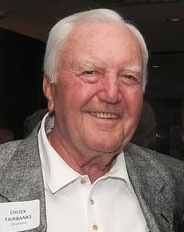
ASU remembers
Chuck Fairbanks
Assistant Coach - 1958 to 1961

April 2, 2013
Chuck Fairbanks, 79, passed away April 2, 2013. He was an American football coach and a head coach at the high school, collegiate and professional levels. The offensive and defensive systems he introduced and helped develop have proven influential in the NFL. Fairbanks graduated from Michigan State University in 1955, following three years of football with the Spartans. That fall, he began the first of three years as head coach of Ishpeming High School in Michigan. In 1958, he accepted an assistant coaching position at ASU in Tempe, spending four years there under former Spartan teammate Frank Kush before moving on for another four-year stint at the University of Houston under Bill Yeoman from 1962 to 1965. In 1966, he accepted an assistant coaching position at the University of Oklahoma in Norman. Following the death of 37 year-old Sooner head coach Jim Mackenzie in April 1967, Fairbanks was promoted to head coach. He had nearly left for another assistant position at Missouri under Dan Devine, but decided to stay in Norman when Mackenzie moved him to offensive coordinator after the 1966 season. Over the next six years, Fairbanks led Oklahoma to three Big Eight Conference titles. Three months after his mid-contract departure to the New England Patriots of the NFL, Oklahoma was forced to forfeit nine games from the 1972 season after evidence of recruiting violations involving altered transcripts of student-athletes surfaced. Fairbanks denied any knowledge of this. The scandal under his watch made Sooners ineligible for bowl games or the national championship for two years after he left. After the probation ended, however, the Sooners, under his successor Barry Switzer, won consecutive national titles in 1974-75. In 1973, Fairbanks was named head coach of the New England Patriots of the NFL. The 1974 season was marred by a league-wide players' strike during training camp and preseason, which actually helped the Patriots as Fairbanks and defensive coordinator Hank Bullough were installing a new system (today known as the Fairbanks-Bullough 3–4, or the 3–4 two-gap system). He then had a falling-out with quarterback Jim Plunkett, who was traded for important draft picks to San Francisco, and suffered when hardball negotiating tactics by Patriot ownership led to a team-wide player strike that cancelled a preseason game with the New York Jets. The team never recovered and fell to 3–11 in 1975, but Fairbanks planted an important seed for the future by drafting quarterback Steve Grogan, who saw his first serious game action later that year. (Source: ASU Foundation, Obituary Registry)